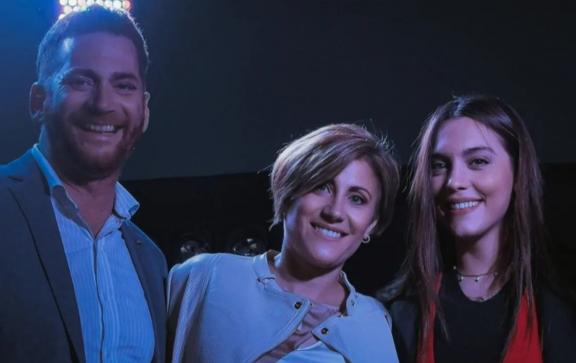Argentina is one of the world's largest exporters of meat, soybeans, cereal, and wheat. In 2021, the agriculture sector accounted for 15.7 per cent of gross domestic product (GDP), seeing significant growth in crop production and an expansion in overall land devoted to agriculture over the past few decades.
But this Latin American nation of rich and fertile land faces growing environmental and climate change pressures. The use of agrochemicals, pesticides, and high-emission agricultural practices contributes to climate change, water and soil contamination, and biodiversity loss, with negative impacts on human health and well-being. And as extreme climate events become more frequent, the effect on agriculture will be more severe, making food production and supply more difficult.
“If we do not change the way we are producing food today, soil will become increasingly less fertile. Food will become progressively less nutritious, and with scarce resources, prices will also tend to rise. We believe this could lead to widening gaps in society.”
There is a need to transition to climate-smart, sustainable agriculture. Mili Romano co-founded the innovative start-up Vexxel, which pioneers the development of biodegradable nanocapsules that reduce the need for harmful chemical fertilisers. Coming from a family dedicated to agriculture for generations, she decided to pursue solutions for more sustainable farming practices without using chemicals.

Vexxel’s founders: Mili Romano (right) with Sebastian Pablo Rius (left) and Valeria Campos Bermudez (centre). Photo: Vexxel
Biotechnology protecting agriculture
Vexxel's biodegradable capsules function like a targeted plant medicine. They release agricultural inputs when and where needed, triggered by sensors based on real-time environmental conditions. This on-demand technology reduces the unnecessary use of synthetic fertilisers and pesticides, protecting the ecosystem from the harmful effects of chemicals and over-application. Ensuring a balanced nutrient supply promotes healthier soils, crop nutrition, and more sustainable agriculture while being affordable and competitive.
The technology also has the potential to reduce CO2 emissions. Synthetic fertilisers contribute to around 1.5 per cent of total CO2 emissions. Research indicates that improving soil health can sequester between 0.4 and 1.2 billion tons of CO2 annually. If a farm using 100 tons of synthetic fertiliser annually switches to Vexxel's biocapsules, it could save approximately 150 tons of CO2 annually, significantly reducing its carbon footprint.

Products used to develop biodegradable biocapsules that function like a targeted medicine for plants. Photo: Vexxel
A catalyst for change
As a promising climate tech start-up, Vexxel received support from CATAL1.5°T (pronounced "catalyst"), a USD 40 million initiative financed by the Green Climate Fund (GCF) and implemented by Deutsche Gesellschaft fuer Internationale Zusammenarbeit (GIZ).
The CATALI.5°T initiative supports climate start-ups and young businesses with the highest climate mitigation impact and business growth potential in Latin America and West Africa. The initiative offers various programmes to help start-ups, particularly women-led start-ups, access venture capital more easily.
CATALI.5°T supported Vexxel's business approach, making the business more competitive and better positioned for fundraising in a challenging business landscape where biotechnology is often overlooked. Participating in the CATAL1.5°T accelerator programme has been a transformative experience for Vexxel, providing essential tools, insights, mentorship, and resources to integrate sustainability into every aspect of their business.
“CATAL1.5°T helped us realise that creating real impact goes beyond having innovative technology; it requires a comprehensive approach. CATAL1.5°T mentors changed the way we think about business, making us more competitive, refining our strategies and operations, and being better prepared for future challenges.”
Mili's journey in the climate tech sector is a testament to the power of female leadership. While she is often the only woman at client meetings, she is sure that change is on the horizon. "It's a great time for female leaders and founders. Though most people in leading roles are still male, I see more and more women in the industry and at events," she says.
Looking ahead
Vexxel offers consulting services to help farmers implement their biocapsule technology effectively and collaborates in research and development to innovate continuously. Currently, they're preparing to launch their first product in Mexico—a biodegradable anti-fungicide that eliminates all the chemicals needed to kill fungus and extends the product's shelf life by five times.
"Networks and support systems are vital for our success. The connections we've made through the CATAL1.5°T programme have been invaluable, and we're excited to continue this journey," says Milli.
Story originally published by CATAL1.5°T. Edited by Zeenia Dastur, GCF
—
This story is part of a series featuring climate tech start-ups supported by the CATALI.5°T initiative, a USD 40 million initiative financed by the Green Climate Fund (GCF) and implemented by Deutsche Gesellschaft fuer Internationale Zusammenarbeit (GIZ).
The CATALI.5°T initiative supports climate start-ups and young businesses with the highest climate mitigation impact and business growth potential in Latin America and West Africa.
Explore the other stories in this series: